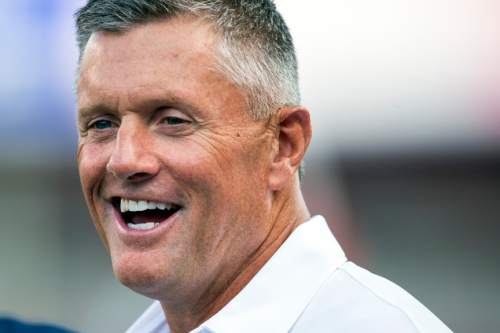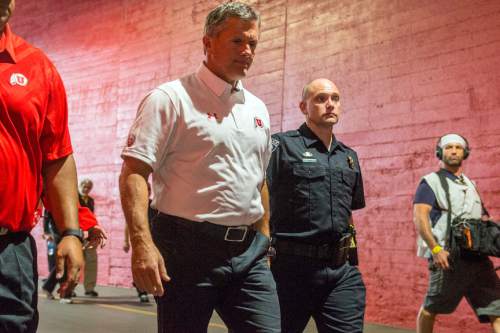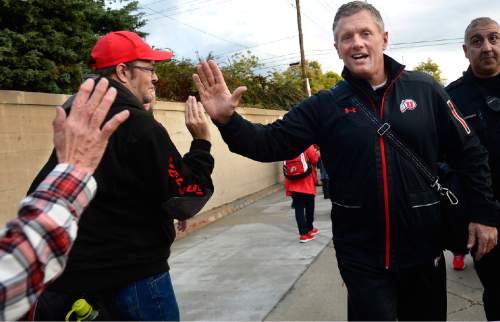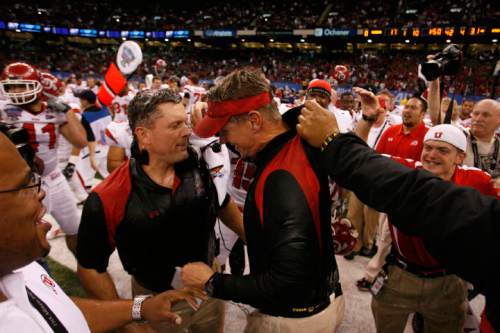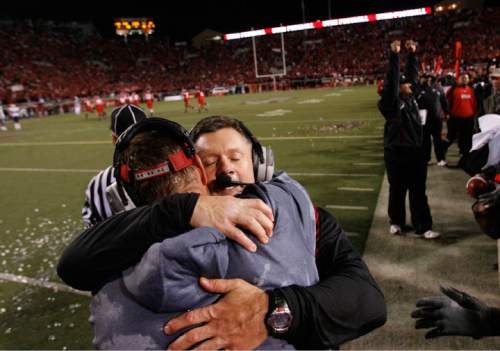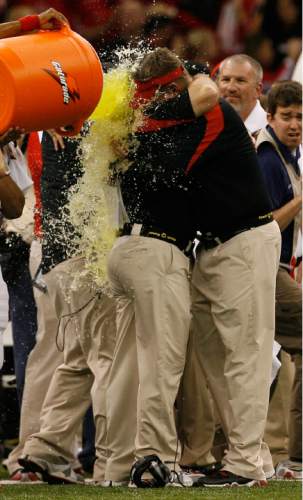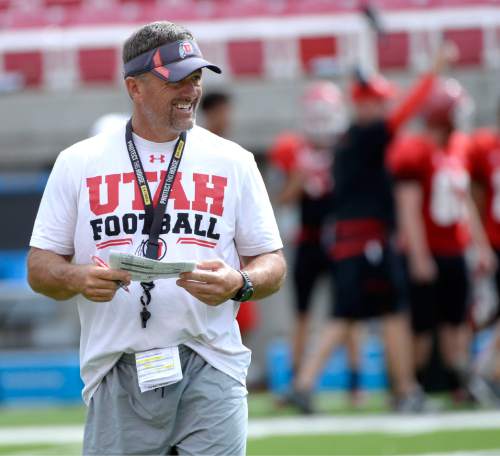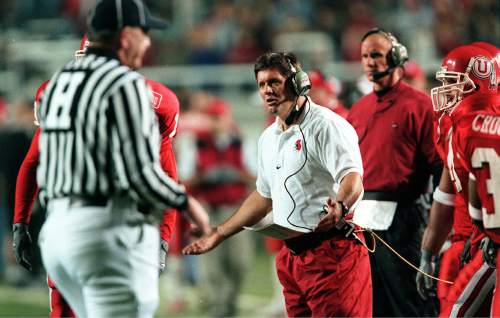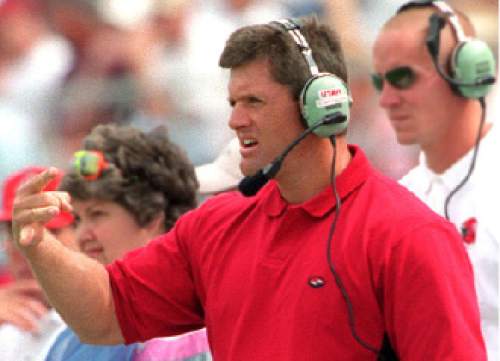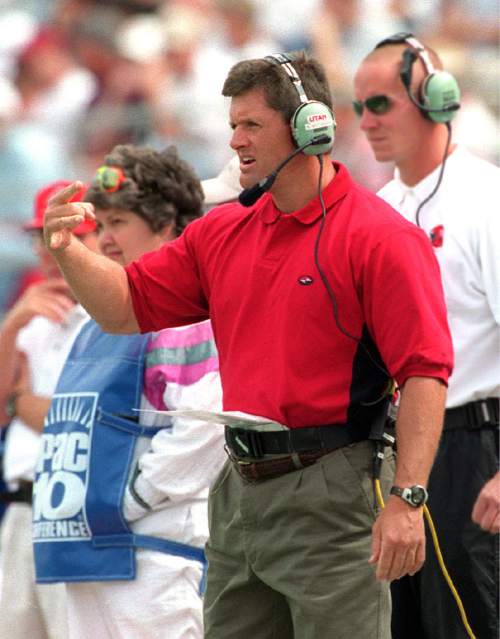This is an archived article that was published on sltrib.com in 2015, and information in the article may be outdated. It is provided only for personal research purposes and may not be reprinted.
A few days were enough for Gary Andersen to know he couldn't be an assistant coach at Utah. He didn't want to learn on the job, or be seen as a token "Utah Man." He wanted to feel 100 percent prepared. He returned to Ricks College.
"I needed to go through the coaching ranks the hard way," Andersen said.
It's a little-recorded but pivotal detail of state football history that Andersen bailed after he was hired to an undetermined post by new Utah coach Ron McBride in 1990. Had he stuck around, McBride believes, "he would probably be the head coach at Utah right now."
McBride was miffed by the about-face for the better part of seven years, when he finally cooled off and with some input from his defensive coordinator — a guy Andersen had met going the hard way through the coaching ranks — decided to give Andersen another shot.
That guy was Kyle Whittingham.
—
The hard way • Andersen describes his first interaction with Whittingham as "kinda funny." He'd served two more years as offensive line coach at Ricks before landing an offer from incoming Idaho State head coach Brian McNeely, followed by a call from Whittingham, then McNeely's newly promoted defensive coordinator.
Whittingham's advice: "You're in a great spot. Stay where you're at."
Such was the state of things in Pocatello — abysmal since the departure of Dave Kragthorpe in 1982. But this time, Andersen was determined to move up a rung.
"I told him I'm coming."
Andersen had no experience as a defensive line coach but impressed Whittingham as organized, intelligent and on great terms with players.
"Right up my alley," Whittingham smiled.
In fact, they lived a couple of blocks from each other — both fathers to young children and coaches to overmatched players.
When Whittingham left Idaho State in 1994 after what he describes as a "dysfunctional" situation, Andersen said he felt an obligation to follow.
McBride's memory is that Whittingham was "kind of out of a job," but Whittingham said he was never let go by ISU and went straight from there to Utah. McNeely's version is unknowable. He died this past May.
Whatever happened, McBride then tapped Whittingham to coach the defensive linemen under his father, Fred, despite initial doubts about that arrangement.
"I really wasn't excited about having two family members on the same staff at that time, but [former ISU and then-Utah offensive line coach] Tim [Davis] really went to bat for Kyle and said this guy would be a great hire," McBride said. "He said he's really smart. He said he's a hard-working kid. He played at BYU, he understands what BYU is doing offensively and how to defense it."
Andersen, meanwhile, did not land as softly.
He moved back to Salt Lake City and became an in-school suspension teacher at Highland High, making $13 an hour while his wife, Stacey, was pregnant with twins. He coached at Park City High.
When Whittingham replaced Fred as defensive coordinator, in 1995, Andersen filled a vacancy at Northern Arizona that was created by Bronco Mendenhall's departure for Oregon State.
The onetime Bengals finally reunited at the U. in April 1997, when Davis accepted a job at Wisconsin.
"I always wanted to bring [Andersen] back, but I was still a little upset about the fact that he had left me early," McBride said. "But he had kind of reproven himself, and he and Kyle were very close."
Whittingham had previously introduced Andersen to his father, whom Andersen calls "Big Fred," and his NFL colleagues for a crash course in defensive principles. In 1998, the tutorial was extended when Fred Sr. rejoined Utah's staff as linebackers coach.
Andersen chuckled as he recalled drawing things up with Whittingham while Fred Sr. — "the best defensive mind that I've ever been around, by far," Andersen said — appeared half-asleep in the back of the room.
"He can barely stay awake because we bore him so bad," Andersen said. Finally, they asked what he thought.
"He said, 'You know what? You guys can do that, but you'll lose.'"
McBride would let Whittingham Sr. go after a 4-7 2000 season, but much of what Andersen teaches to this day is word-for-word what he first learned from Big Fred.
—
Re-reunion • Andersen and Whittingham parted ways again in 2002, when Andersen left to become head coach at Southern Utah and Utah hired a little-known coach from Bowling Green named Urban Meyer.
Meyer knew Whittingham had been successful, "but I really had no intent of keeping Kyle on our staff," he said. "I wanted to start fresh."
A meeting with Whittingham changed his mind. He was sharp, and like Meyer, ultra-competitive. They'd come to argue about who was in better shape and one day raced to This Is The Place Heritage Park — "I beat him right at the end," Meyer said. "He's an animal, but I got him."
Whittingham also earned Meyer's trust with his eye for talent and by holding opponents to under 19 points per game in 2003. When he urged Meyer to go after Andersen, before the 2004 season, Meyer listened.
"We were not right in the defensive line," he said, crediting Andersen's motivational tactics for finding a new gear in Sione Pouha, Steve Fifita and Marquess Ledbetter during the 2004 season — the first of two BCS-busting campaigns Andersen and Whittingham would share at the U.
When Meyer was hired by Florida and gave his blessing to Whittingham — "If he's not the best coach I've ever been around, he's one of the top two or three I've ever been around," he maintains — Whittingham in turn elevated Andersen to defensive coordinator.
Contrary to the behavior you might expect from a decade-long coordinator, Whittingham gave Andersen "unbelievable space" to operate, Andersen said, and they added some zone blitzes to Big Fred's framework. Under their guidance, Utah went 7-5, then 8-5, then 9-4, then, of course, undefeated again.
Days after Andersen accepted the head job at Utah State in December 2008, Whittingham phoned him and said, "I'd like you to call it one more time, if you will."
So Andersen shuttled back and forth between Salt Lake City and Logan. When the Sugar Bowl was over and mighty Alabama had been held to 208 total yards, they shared a long hug on the field. Andersen has a photo of that embrace that he looks at on occasion. After 15 years, going from Pocatello to the Superdome, they had one evening to breathe it in.
"They were very quick and crisp and clean after that game, but those moments were pretty special," Andersen said.
—
Imitation, flattery • Kalani Sitake was a graduate assistant at BYU in 2002 when Whittingham and Andersen approached him on the field, remembering him from his playing days as a self-described "no-name fullback."
"I was just a nobody GA, and [they] took the time to get to know me a little bit more," he said. It left an impression.
Later, when Andersen got the Southern Utah job, Sitake remembers thinking, "Dude, I'm going there. This guy is awesome."
In 2005, when Sitake interviewed for an opening at Utah, Whittingham told him to take off his tie and his suit coat. "Let's just talk," he said.
"It was the best interview I'd ever had," Sitake said. "I didn't feel like I had to sell myself. I just had to let him see who I was."
Common experience makes it easy to relate the two, but they have their differences. Whittingham is powerfully built, square-jawed and it's easy to imagine him as a BYU linebacker, whereas the taller Andersen looks more like a marathoner than a former Utah lineman.
Whittingham is much more reserved. People frequently describe him as "consistent." Andersen is a willing conversationalist. A button-pusher.
Some in their coaching circle declined to describe them at all, fearing that by praising one, they'd slight the other.
But what they have in common — besides an affinity for classic rock that Sitake attributes with a laugh to "a generation thing" — is that many feel they owe them a great debt.
Said Meyer, who talks to each every couple of weeks: "What I like about them is they never gave up on a kid. Steve Fifita had one foot in and one foot out, and if it wasn't for Kyle Whittingham and Gary Andersen, he never would have finished the way he did."
Utah defensive end Jason Fanaika, who played for Andersen at Utah State in 2010-11, solicits advice from Andersen about football and life. And a few weeks after Fanaika arrived at the U. as a walk-on, Whittingham was on hand as he and his wife's marriage was sealed in the temple.
"I think they both kind of represent the same thing as far as loyalty and character-building," Fanaika said.
Both talk about "respecting the process," a phrase Whittingham remembers coining but doesn't mind seeing on T-shirts that Andersen prints for his team.
"We hung onto a lot of stuff that Urban did, who probably copied it from Lou Holtz, who probably copied it from someone else," he said. "... Stuff that has been good over the years, so why not use it?"
Sitake, now defensive coordinator at Oregon State after succeeding Andersen at the U., said he's not shy about continuing to preach the concepts he learned at the U., concepts that can be traced back to Big Fred.
"I don't have any ego about it," he said. "If people say, 'Oh yeah, you're just trying to do what Kyle and Gary do,' yes, you're damn right I am. ... Hopefully, one day people will learn what they do from me. I've got to give credit where credit is due."
Six assistants at Saturday's game will have worked for both men, who are now to this generation of Utah coaches what LaVell Edwards and McBride were to the last.
Whittingham and Andersen talk regularly — if not every week and likely not this week. (Whittingham doesn't chat with opponents on game weeks, Andersen explained.) Even after Andersen lured away Sitake and Tuiaki over the holidays, he said they planned to shared a dinner table.
After all, who knows? Their roles might've been reversed if Andersen, 25 years ago, hadn't gotten cold feet.
He's grateful that he did. And he's grateful for the man he'd meet in Pocatello.
Said Andersen: "Kyle Whittingham gave me a chance."
Twitter: @matthew_piper —
Oregon State at No. 13 Utah
P At Rice-Eccles Stadium
Kickoff • Saturday, 5 p.m.
TV • Pac-12 Network.
Radio • 700 AM
Series history • OSU leads 11-7-1
Last meeting • Oct. 16, 2014 in Corvallis, Ore.; Utah 29, OSU 23 (2OT)
About the Utes • Utah was ranked No. 3 before a 42-24 loss to USC in which Travis Wilson threw four interceptions and Utah's previously opportunistic defense failed to generate any turnovers. Still, Utah is No. 2 nationally takeaways (19) and No. 3 in interceptions (13), and first in the Pac-12 in rushing defense (114 yards per game. Senior running back Devontae Booker had a season-low 14 carries against the Trojans but still caught six passes and has 1,102 yards from scrimmage this season.
About the Beavers • Oregon State went to a dual-quarterback offense against Colorado, rotating true freshman Seth Collins and redshirt freshman Nick Mitchell to mixed results. Collins — who reportedly missed Thursday's practice — is a bruising runner on pace for more than 900 yards, while Mitchell is more of a pocket passer. Defensively, the Beavers have allowed just 17 points in six quarters since allowing Logan product Luke Falk to pass for six touchdowns in the first half of Washington State's victory. —
Coaching crossover
A half-dozen coaches on the sidelines at Saturday's game will have played and/or coached for both Kyle Whittingham and Gary Andersen.
Utah co-offensive coordinator Aaron Roderick • Hired by Andersen as offensive coordinator at Southern Utah in 2003, then hired by Whittingham to coach receivers in 2005.
Utah special teams coordinator/safeties coach Morgan Scalley • Played under both Whittingham and Andersen and then worked with both at the U.
Utah tight ends coach Lewis Powell • Played under both at the U., with Andersen as his position coach.
Oregon State defensive coordinator Kalani Sitake • Hired by Andersen as running backs/tight ends coach at SUU in 2003, hired by Whittingham as linebackers coach in 2005, hired by Andersen in December.
Oregon State linebackers coach Ilaisa Tuiaki • Played for Andersen at SUU, hired by Andersen as special teams and running backs coach at Utah State, hired by Whittingham as fullbacks and tight ends coach in 2012, hired by Andersen in December.
Oregon State defensive line coach Chad Kauha'aha'a • Played at Utah for Whittingham — with one year in his position group — and was later hired by Andersen to coach the line at Utah State, hired by Whittingham at Utah, hired again by Andersen at Wisconsin and followed Andersen to Oregon State.
Derrick Odum • Coached under Whittingham and Andersen at Utah, hired by Andersen at Oregon State.


